Journal of Attention Disorders
VerifiedAdded on 2022/08/24
|8
|1720
|39
AI Summary
Contribute Materials
Your contribution can guide someone’s learning journey. Share your
documents today.
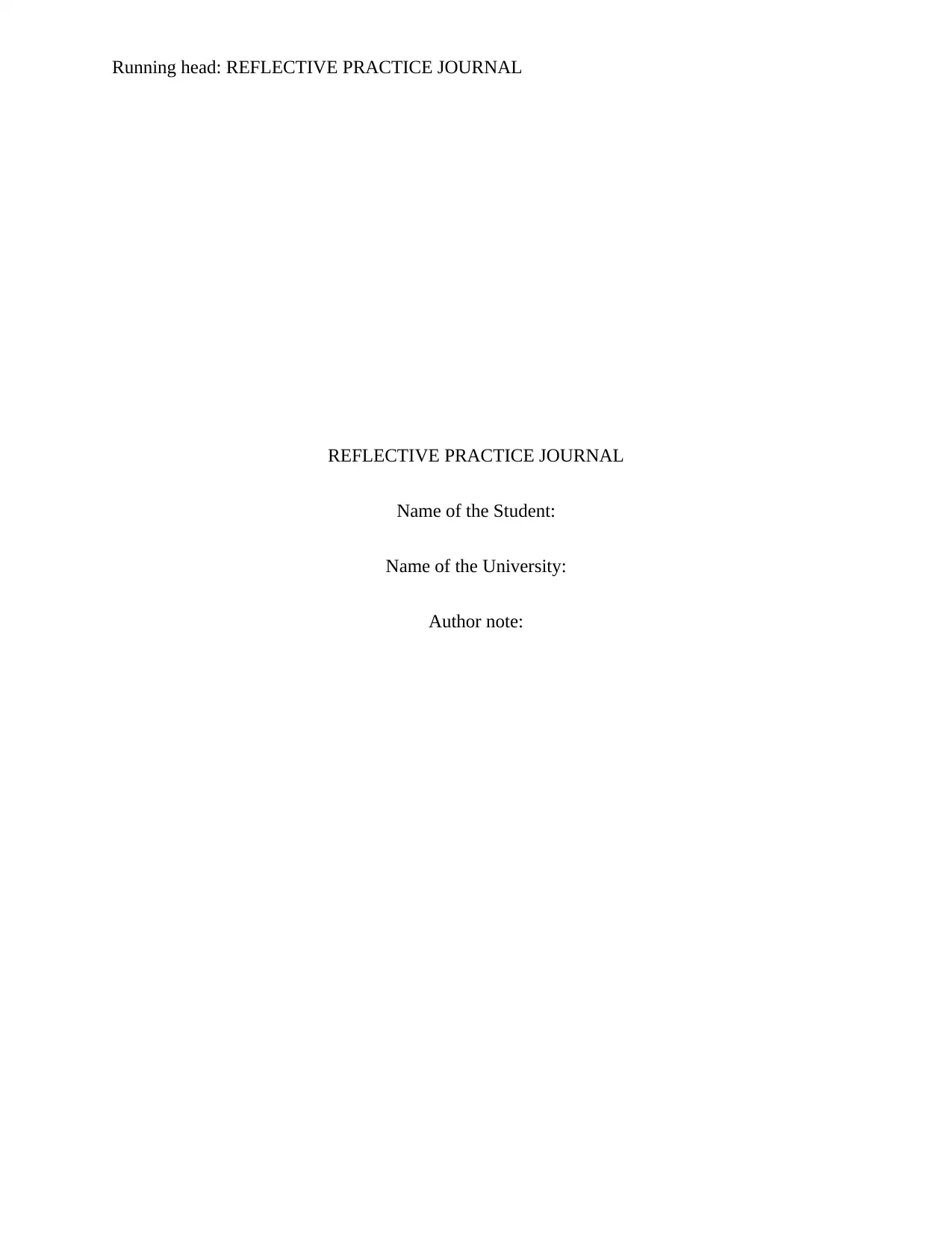
Running head: REFLECTIVE PRACTICE JOURNAL
REFLECTIVE PRACTICE JOURNAL
Name of the Student:
Name of the University:
Author note:
REFLECTIVE PRACTICE JOURNAL
Name of the Student:
Name of the University:
Author note:
Secure Best Marks with AI Grader
Need help grading? Try our AI Grader for instant feedback on your assignments.
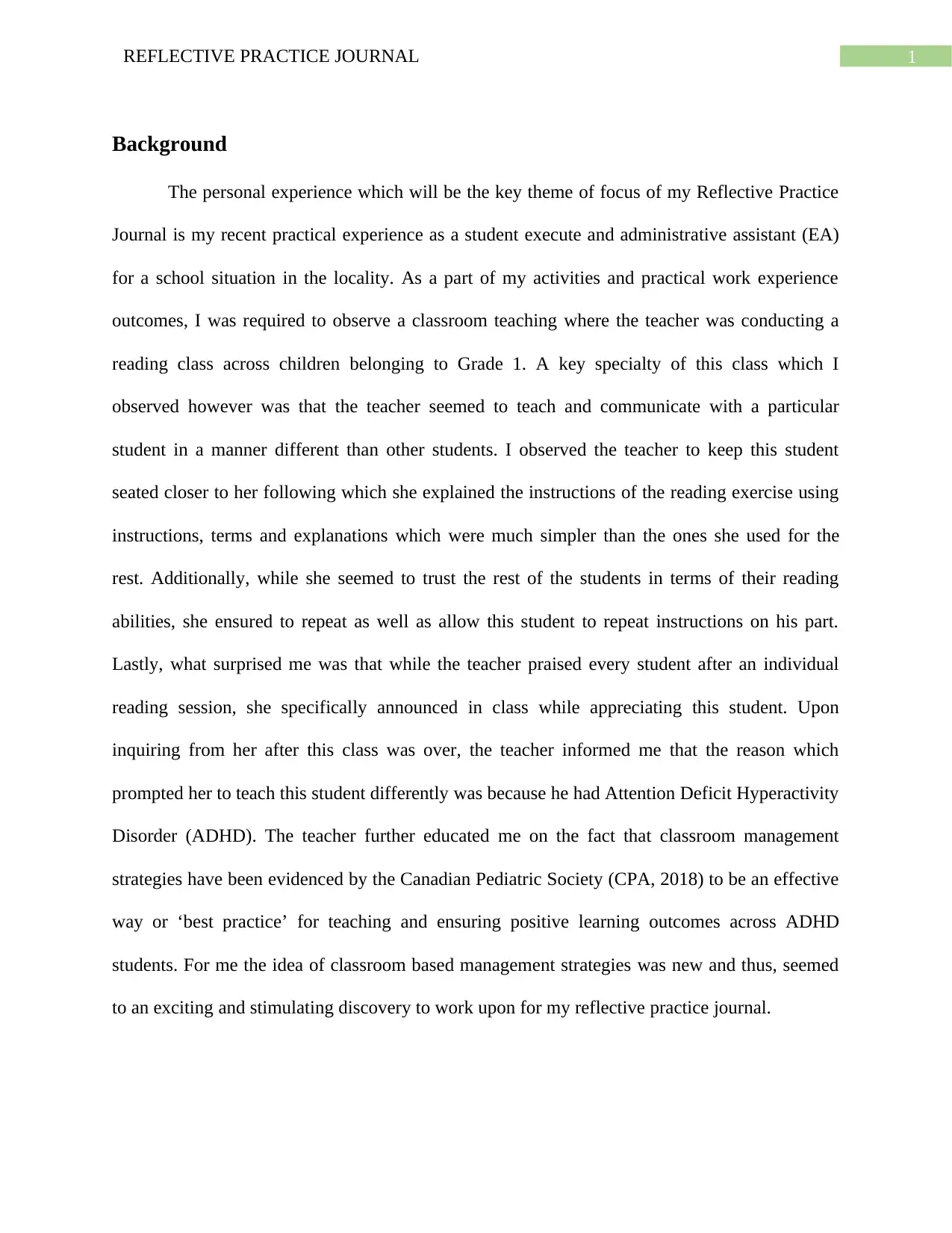
1REFLECTIVE PRACTICE JOURNAL
Background
The personal experience which will be the key theme of focus of my Reflective Practice
Journal is my recent practical experience as a student execute and administrative assistant (EA)
for a school situation in the locality. As a part of my activities and practical work experience
outcomes, I was required to observe a classroom teaching where the teacher was conducting a
reading class across children belonging to Grade 1. A key specialty of this class which I
observed however was that the teacher seemed to teach and communicate with a particular
student in a manner different than other students. I observed the teacher to keep this student
seated closer to her following which she explained the instructions of the reading exercise using
instructions, terms and explanations which were much simpler than the ones she used for the
rest. Additionally, while she seemed to trust the rest of the students in terms of their reading
abilities, she ensured to repeat as well as allow this student to repeat instructions on his part.
Lastly, what surprised me was that while the teacher praised every student after an individual
reading session, she specifically announced in class while appreciating this student. Upon
inquiring from her after this class was over, the teacher informed me that the reason which
prompted her to teach this student differently was because he had Attention Deficit Hyperactivity
Disorder (ADHD). The teacher further educated me on the fact that classroom management
strategies have been evidenced by the Canadian Pediatric Society (CPA, 2018) to be an effective
way or ‘best practice’ for teaching and ensuring positive learning outcomes across ADHD
students. For me the idea of classroom based management strategies was new and thus, seemed
to an exciting and stimulating discovery to work upon for my reflective practice journal.
Background
The personal experience which will be the key theme of focus of my Reflective Practice
Journal is my recent practical experience as a student execute and administrative assistant (EA)
for a school situation in the locality. As a part of my activities and practical work experience
outcomes, I was required to observe a classroom teaching where the teacher was conducting a
reading class across children belonging to Grade 1. A key specialty of this class which I
observed however was that the teacher seemed to teach and communicate with a particular
student in a manner different than other students. I observed the teacher to keep this student
seated closer to her following which she explained the instructions of the reading exercise using
instructions, terms and explanations which were much simpler than the ones she used for the
rest. Additionally, while she seemed to trust the rest of the students in terms of their reading
abilities, she ensured to repeat as well as allow this student to repeat instructions on his part.
Lastly, what surprised me was that while the teacher praised every student after an individual
reading session, she specifically announced in class while appreciating this student. Upon
inquiring from her after this class was over, the teacher informed me that the reason which
prompted her to teach this student differently was because he had Attention Deficit Hyperactivity
Disorder (ADHD). The teacher further educated me on the fact that classroom management
strategies have been evidenced by the Canadian Pediatric Society (CPA, 2018) to be an effective
way or ‘best practice’ for teaching and ensuring positive learning outcomes across ADHD
students. For me the idea of classroom based management strategies was new and thus, seemed
to an exciting and stimulating discovery to work upon for my reflective practice journal.
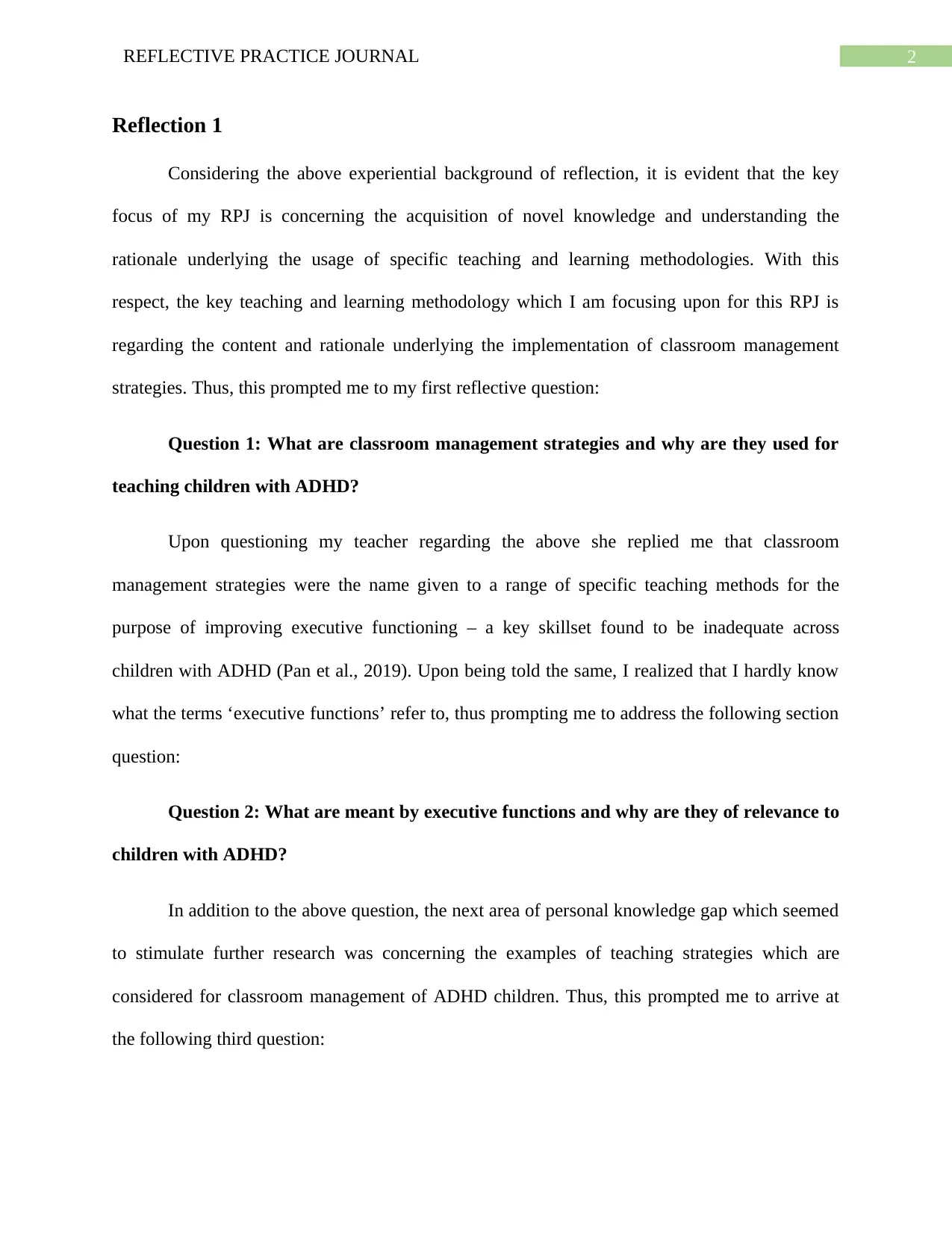
2REFLECTIVE PRACTICE JOURNAL
Reflection 1
Considering the above experiential background of reflection, it is evident that the key
focus of my RPJ is concerning the acquisition of novel knowledge and understanding the
rationale underlying the usage of specific teaching and learning methodologies. With this
respect, the key teaching and learning methodology which I am focusing upon for this RPJ is
regarding the content and rationale underlying the implementation of classroom management
strategies. Thus, this prompted me to my first reflective question:
Question 1: What are classroom management strategies and why are they used for
teaching children with ADHD?
Upon questioning my teacher regarding the above she replied me that classroom
management strategies were the name given to a range of specific teaching methods for the
purpose of improving executive functioning – a key skillset found to be inadequate across
children with ADHD (Pan et al., 2019). Upon being told the same, I realized that I hardly know
what the terms ‘executive functions’ refer to, thus prompting me to address the following section
question:
Question 2: What are meant by executive functions and why are they of relevance to
children with ADHD?
In addition to the above question, the next area of personal knowledge gap which seemed
to stimulate further research was concerning the examples of teaching strategies which are
considered for classroom management of ADHD children. Thus, this prompted me to arrive at
the following third question:
Reflection 1
Considering the above experiential background of reflection, it is evident that the key
focus of my RPJ is concerning the acquisition of novel knowledge and understanding the
rationale underlying the usage of specific teaching and learning methodologies. With this
respect, the key teaching and learning methodology which I am focusing upon for this RPJ is
regarding the content and rationale underlying the implementation of classroom management
strategies. Thus, this prompted me to my first reflective question:
Question 1: What are classroom management strategies and why are they used for
teaching children with ADHD?
Upon questioning my teacher regarding the above she replied me that classroom
management strategies were the name given to a range of specific teaching methods for the
purpose of improving executive functioning – a key skillset found to be inadequate across
children with ADHD (Pan et al., 2019). Upon being told the same, I realized that I hardly know
what the terms ‘executive functions’ refer to, thus prompting me to address the following section
question:
Question 2: What are meant by executive functions and why are they of relevance to
children with ADHD?
In addition to the above question, the next area of personal knowledge gap which seemed
to stimulate further research was concerning the examples of teaching strategies which are
considered for classroom management of ADHD children. Thus, this prompted me to arrive at
the following third question:
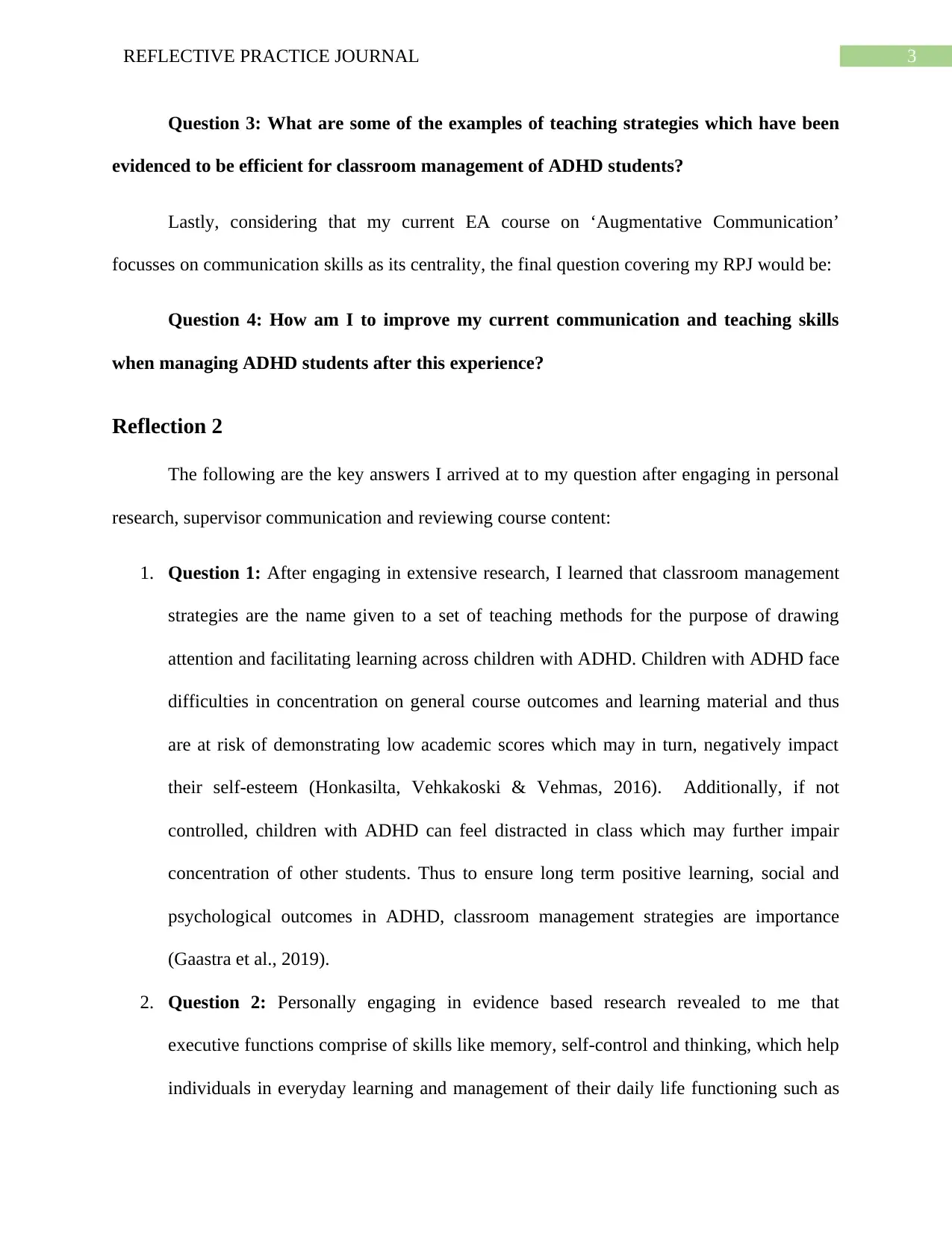
3REFLECTIVE PRACTICE JOURNAL
Question 3: What are some of the examples of teaching strategies which have been
evidenced to be efficient for classroom management of ADHD students?
Lastly, considering that my current EA course on ‘Augmentative Communication’
focusses on communication skills as its centrality, the final question covering my RPJ would be:
Question 4: How am I to improve my current communication and teaching skills
when managing ADHD students after this experience?
Reflection 2
The following are the key answers I arrived at to my question after engaging in personal
research, supervisor communication and reviewing course content:
1. Question 1: After engaging in extensive research, I learned that classroom management
strategies are the name given to a set of teaching methods for the purpose of drawing
attention and facilitating learning across children with ADHD. Children with ADHD face
difficulties in concentration on general course outcomes and learning material and thus
are at risk of demonstrating low academic scores which may in turn, negatively impact
their self-esteem (Honkasilta, Vehkakoski & Vehmas, 2016). Additionally, if not
controlled, children with ADHD can feel distracted in class which may further impair
concentration of other students. Thus to ensure long term positive learning, social and
psychological outcomes in ADHD, classroom management strategies are importance
(Gaastra et al., 2019).
2. Question 2: Personally engaging in evidence based research revealed to me that
executive functions comprise of skills like memory, self-control and thinking, which help
individuals in everyday learning and management of their daily life functioning such as
Question 3: What are some of the examples of teaching strategies which have been
evidenced to be efficient for classroom management of ADHD students?
Lastly, considering that my current EA course on ‘Augmentative Communication’
focusses on communication skills as its centrality, the final question covering my RPJ would be:
Question 4: How am I to improve my current communication and teaching skills
when managing ADHD students after this experience?
Reflection 2
The following are the key answers I arrived at to my question after engaging in personal
research, supervisor communication and reviewing course content:
1. Question 1: After engaging in extensive research, I learned that classroom management
strategies are the name given to a set of teaching methods for the purpose of drawing
attention and facilitating learning across children with ADHD. Children with ADHD face
difficulties in concentration on general course outcomes and learning material and thus
are at risk of demonstrating low academic scores which may in turn, negatively impact
their self-esteem (Honkasilta, Vehkakoski & Vehmas, 2016). Additionally, if not
controlled, children with ADHD can feel distracted in class which may further impair
concentration of other students. Thus to ensure long term positive learning, social and
psychological outcomes in ADHD, classroom management strategies are importance
(Gaastra et al., 2019).
2. Question 2: Personally engaging in evidence based research revealed to me that
executive functions comprise of skills like memory, self-control and thinking, which help
individuals in everyday learning and management of their daily life functioning such as
Secure Best Marks with AI Grader
Need help grading? Try our AI Grader for instant feedback on your assignments.
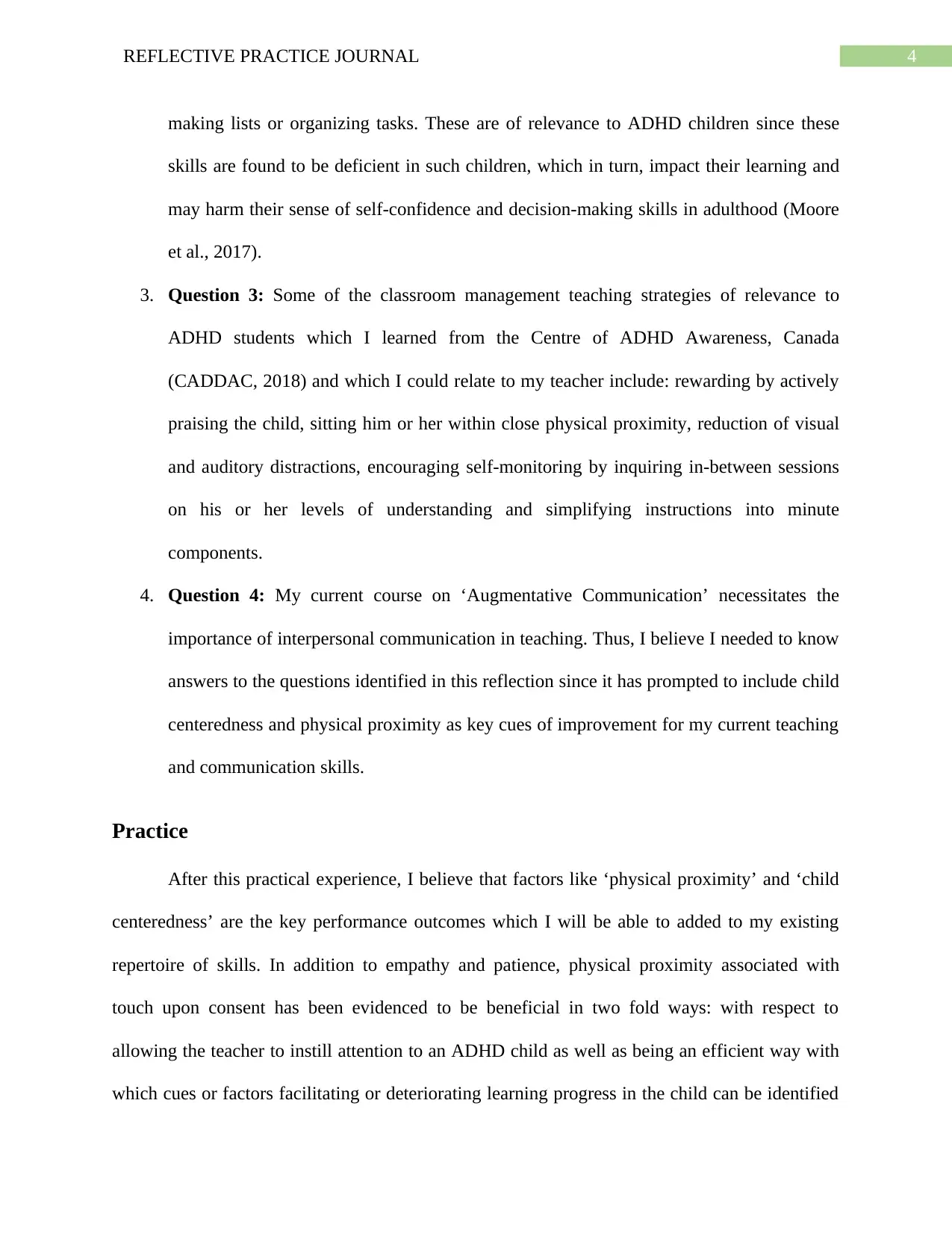
4REFLECTIVE PRACTICE JOURNAL
making lists or organizing tasks. These are of relevance to ADHD children since these
skills are found to be deficient in such children, which in turn, impact their learning and
may harm their sense of self-confidence and decision-making skills in adulthood (Moore
et al., 2017).
3. Question 3: Some of the classroom management teaching strategies of relevance to
ADHD students which I learned from the Centre of ADHD Awareness, Canada
(CADDAC, 2018) and which I could relate to my teacher include: rewarding by actively
praising the child, sitting him or her within close physical proximity, reduction of visual
and auditory distractions, encouraging self-monitoring by inquiring in-between sessions
on his or her levels of understanding and simplifying instructions into minute
components.
4. Question 4: My current course on ‘Augmentative Communication’ necessitates the
importance of interpersonal communication in teaching. Thus, I believe I needed to know
answers to the questions identified in this reflection since it has prompted to include child
centeredness and physical proximity as key cues of improvement for my current teaching
and communication skills.
Practice
After this practical experience, I believe that factors like ‘physical proximity’ and ‘child
centeredness’ are the key performance outcomes which I will be able to added to my existing
repertoire of skills. In addition to empathy and patience, physical proximity associated with
touch upon consent has been evidenced to be beneficial in two fold ways: with respect to
allowing the teacher to instill attention to an ADHD child as well as being an efficient way with
which cues or factors facilitating or deteriorating learning progress in the child can be identified
making lists or organizing tasks. These are of relevance to ADHD children since these
skills are found to be deficient in such children, which in turn, impact their learning and
may harm their sense of self-confidence and decision-making skills in adulthood (Moore
et al., 2017).
3. Question 3: Some of the classroom management teaching strategies of relevance to
ADHD students which I learned from the Centre of ADHD Awareness, Canada
(CADDAC, 2018) and which I could relate to my teacher include: rewarding by actively
praising the child, sitting him or her within close physical proximity, reduction of visual
and auditory distractions, encouraging self-monitoring by inquiring in-between sessions
on his or her levels of understanding and simplifying instructions into minute
components.
4. Question 4: My current course on ‘Augmentative Communication’ necessitates the
importance of interpersonal communication in teaching. Thus, I believe I needed to know
answers to the questions identified in this reflection since it has prompted to include child
centeredness and physical proximity as key cues of improvement for my current teaching
and communication skills.
Practice
After this practical experience, I believe that factors like ‘physical proximity’ and ‘child
centeredness’ are the key performance outcomes which I will be able to added to my existing
repertoire of skills. In addition to empathy and patience, physical proximity associated with
touch upon consent has been evidenced to be beneficial in two fold ways: with respect to
allowing the teacher to instill attention to an ADHD child as well as being an efficient way with
which cues or factors facilitating or deteriorating learning progress in the child can be identified
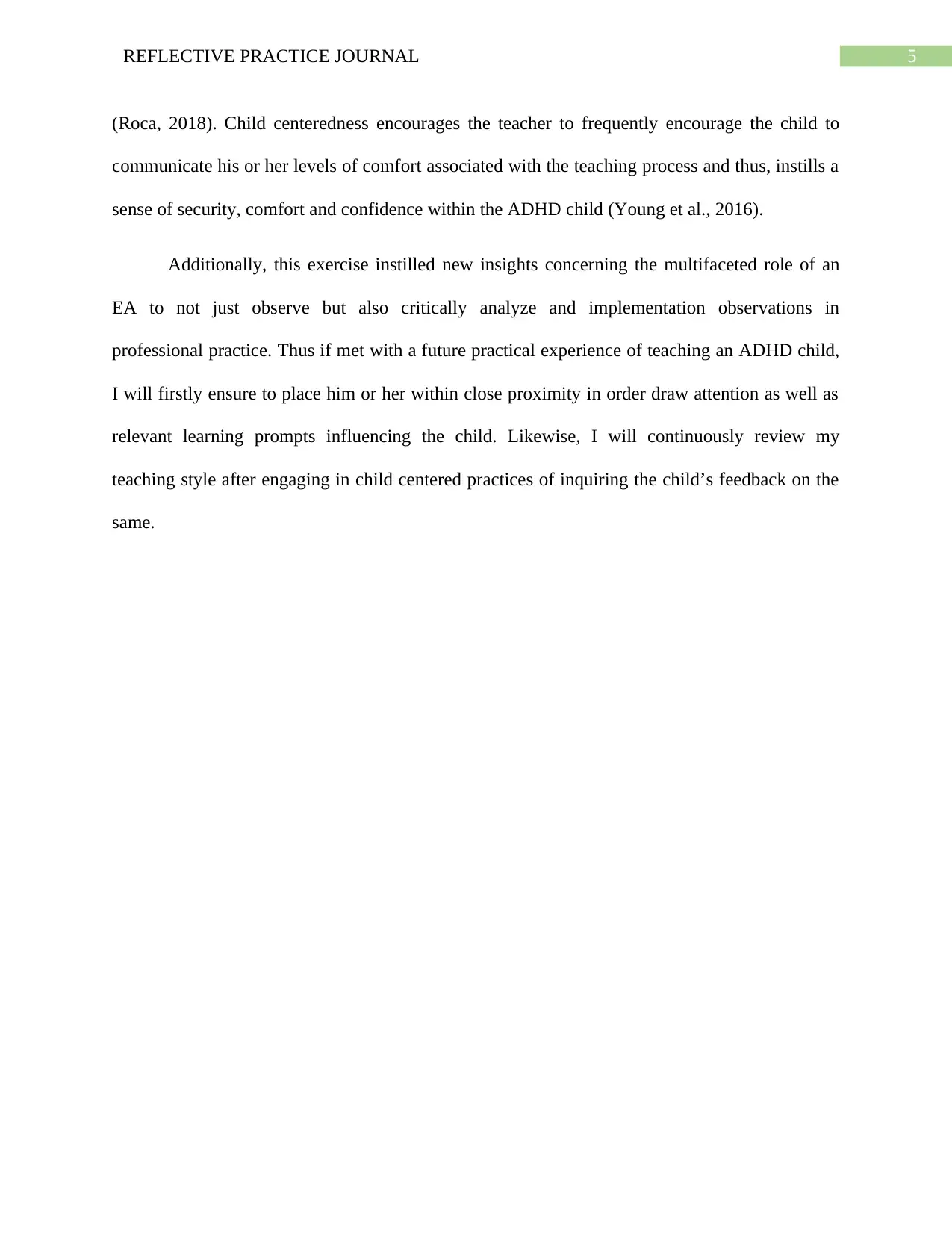
5REFLECTIVE PRACTICE JOURNAL
(Roca, 2018). Child centeredness encourages the teacher to frequently encourage the child to
communicate his or her levels of comfort associated with the teaching process and thus, instills a
sense of security, comfort and confidence within the ADHD child (Young et al., 2016).
Additionally, this exercise instilled new insights concerning the multifaceted role of an
EA to not just observe but also critically analyze and implementation observations in
professional practice. Thus if met with a future practical experience of teaching an ADHD child,
I will firstly ensure to place him or her within close proximity in order draw attention as well as
relevant learning prompts influencing the child. Likewise, I will continuously review my
teaching style after engaging in child centered practices of inquiring the child’s feedback on the
same.
(Roca, 2018). Child centeredness encourages the teacher to frequently encourage the child to
communicate his or her levels of comfort associated with the teaching process and thus, instills a
sense of security, comfort and confidence within the ADHD child (Young et al., 2016).
Additionally, this exercise instilled new insights concerning the multifaceted role of an
EA to not just observe but also critically analyze and implementation observations in
professional practice. Thus if met with a future practical experience of teaching an ADHD child,
I will firstly ensure to place him or her within close proximity in order draw attention as well as
relevant learning prompts influencing the child. Likewise, I will continuously review my
teaching style after engaging in child centered practices of inquiring the child’s feedback on the
same.
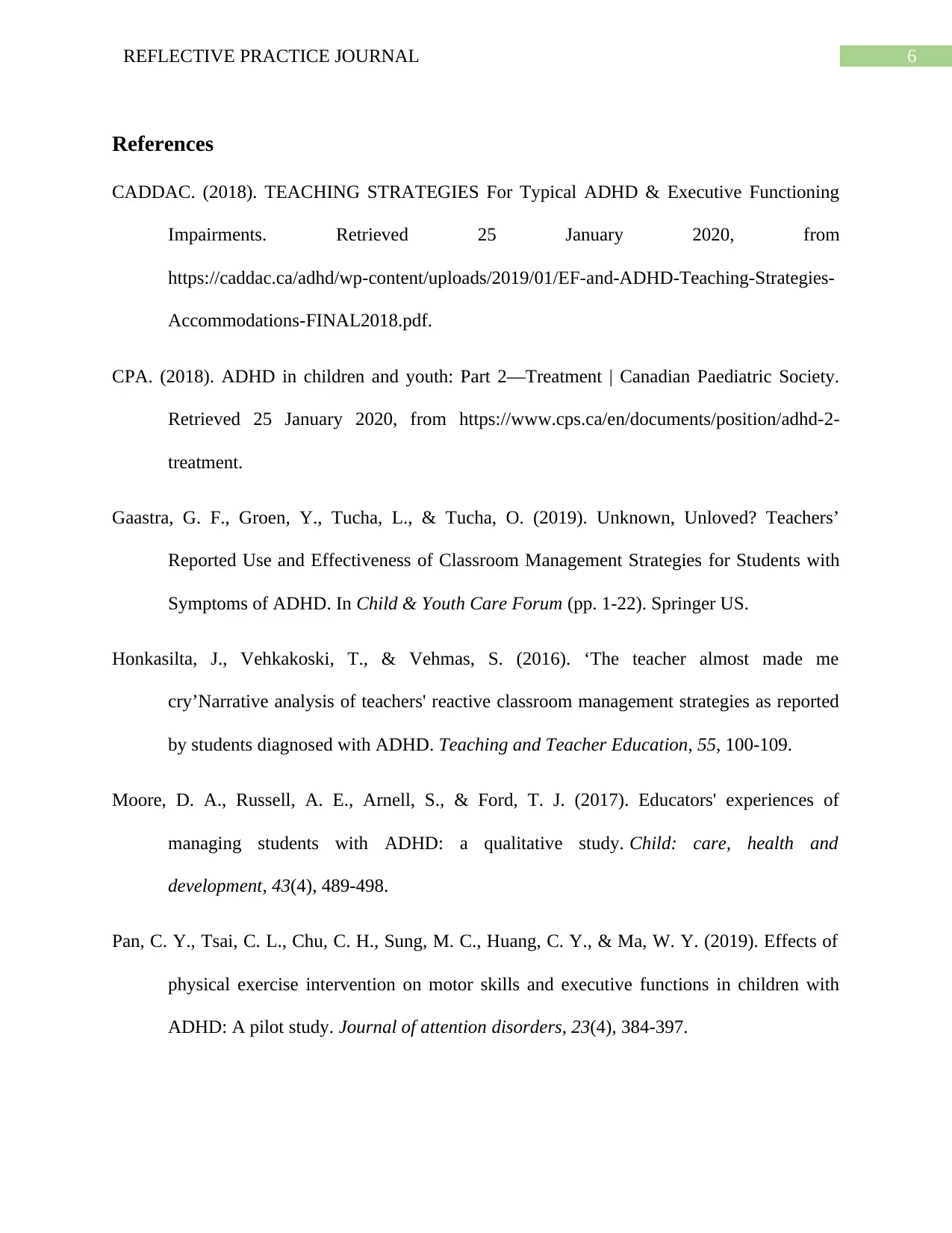
6REFLECTIVE PRACTICE JOURNAL
References
CADDAC. (2018). TEACHING STRATEGIES For Typical ADHD & Executive Functioning
Impairments. Retrieved 25 January 2020, from
https://caddac.ca/adhd/wp-content/uploads/2019/01/EF-and-ADHD-Teaching-Strategies-
Accommodations-FINAL2018.pdf.
CPA. (2018). ADHD in children and youth: Part 2—Treatment | Canadian Paediatric Society.
Retrieved 25 January 2020, from https://www.cps.ca/en/documents/position/adhd-2-
treatment.
Gaastra, G. F., Groen, Y., Tucha, L., & Tucha, O. (2019). Unknown, Unloved? Teachers’
Reported Use and Effectiveness of Classroom Management Strategies for Students with
Symptoms of ADHD. In Child & Youth Care Forum (pp. 1-22). Springer US.
Honkasilta, J., Vehkakoski, T., & Vehmas, S. (2016). ‘The teacher almost made me
cry’Narrative analysis of teachers' reactive classroom management strategies as reported
by students diagnosed with ADHD. Teaching and Teacher Education, 55, 100-109.
Moore, D. A., Russell, A. E., Arnell, S., & Ford, T. J. (2017). Educators' experiences of
managing students with ADHD: a qualitative study. Child: care, health and
development, 43(4), 489-498.
Pan, C. Y., Tsai, C. L., Chu, C. H., Sung, M. C., Huang, C. Y., & Ma, W. Y. (2019). Effects of
physical exercise intervention on motor skills and executive functions in children with
ADHD: A pilot study. Journal of attention disorders, 23(4), 384-397.
References
CADDAC. (2018). TEACHING STRATEGIES For Typical ADHD & Executive Functioning
Impairments. Retrieved 25 January 2020, from
https://caddac.ca/adhd/wp-content/uploads/2019/01/EF-and-ADHD-Teaching-Strategies-
Accommodations-FINAL2018.pdf.
CPA. (2018). ADHD in children and youth: Part 2—Treatment | Canadian Paediatric Society.
Retrieved 25 January 2020, from https://www.cps.ca/en/documents/position/adhd-2-
treatment.
Gaastra, G. F., Groen, Y., Tucha, L., & Tucha, O. (2019). Unknown, Unloved? Teachers’
Reported Use and Effectiveness of Classroom Management Strategies for Students with
Symptoms of ADHD. In Child & Youth Care Forum (pp. 1-22). Springer US.
Honkasilta, J., Vehkakoski, T., & Vehmas, S. (2016). ‘The teacher almost made me
cry’Narrative analysis of teachers' reactive classroom management strategies as reported
by students diagnosed with ADHD. Teaching and Teacher Education, 55, 100-109.
Moore, D. A., Russell, A. E., Arnell, S., & Ford, T. J. (2017). Educators' experiences of
managing students with ADHD: a qualitative study. Child: care, health and
development, 43(4), 489-498.
Pan, C. Y., Tsai, C. L., Chu, C. H., Sung, M. C., Huang, C. Y., & Ma, W. Y. (2019). Effects of
physical exercise intervention on motor skills and executive functions in children with
ADHD: A pilot study. Journal of attention disorders, 23(4), 384-397.
Paraphrase This Document
Need a fresh take? Get an instant paraphrase of this document with our AI Paraphraser
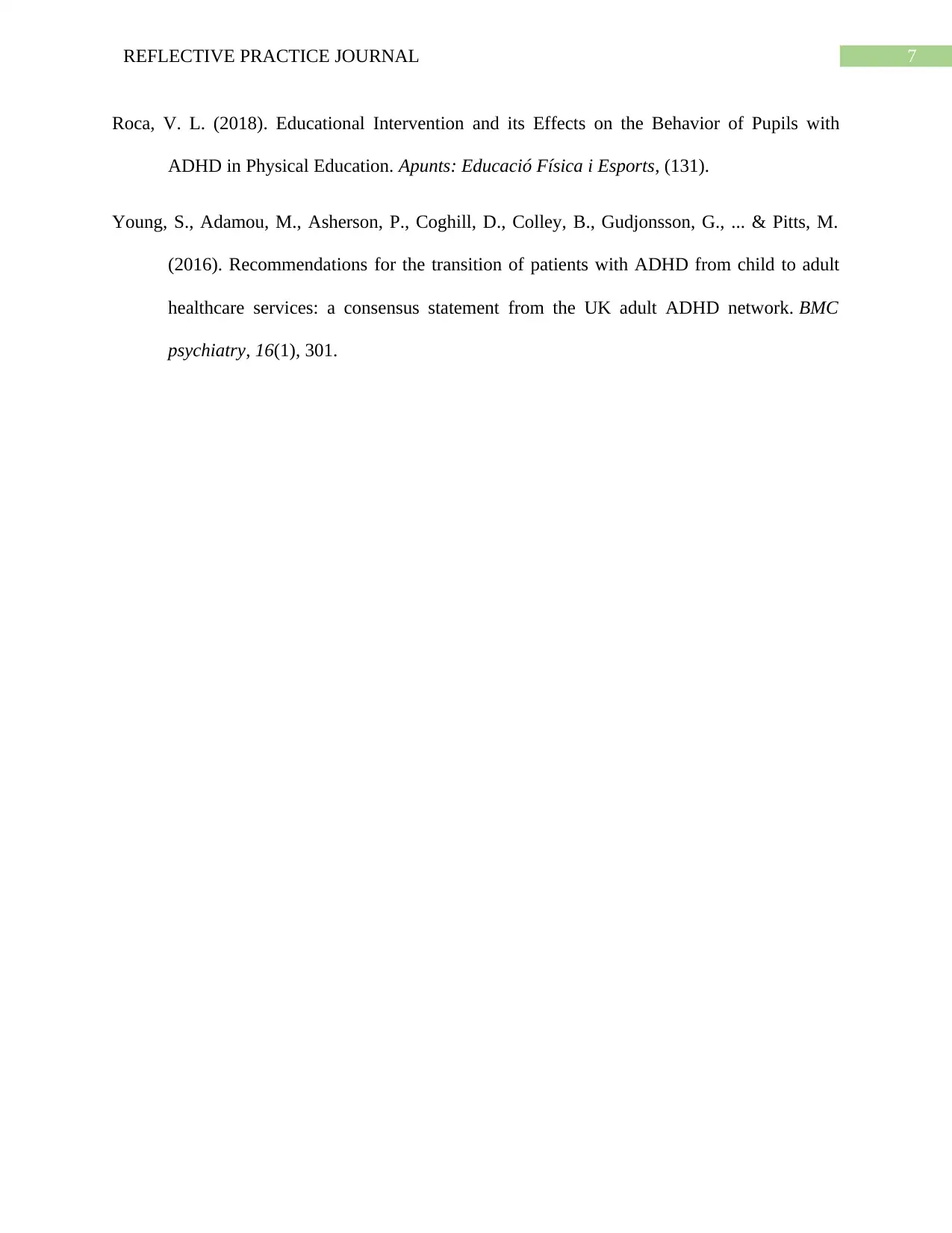
7REFLECTIVE PRACTICE JOURNAL
Roca, V. L. (2018). Educational Intervention and its Effects on the Behavior of Pupils with
ADHD in Physical Education. Apunts: Educació Física i Esports, (131).
Young, S., Adamou, M., Asherson, P., Coghill, D., Colley, B., Gudjonsson, G., ... & Pitts, M.
(2016). Recommendations for the transition of patients with ADHD from child to adult
healthcare services: a consensus statement from the UK adult ADHD network. BMC
psychiatry, 16(1), 301.
Roca, V. L. (2018). Educational Intervention and its Effects on the Behavior of Pupils with
ADHD in Physical Education. Apunts: Educació Física i Esports, (131).
Young, S., Adamou, M., Asherson, P., Coghill, D., Colley, B., Gudjonsson, G., ... & Pitts, M.
(2016). Recommendations for the transition of patients with ADHD from child to adult
healthcare services: a consensus statement from the UK adult ADHD network. BMC
psychiatry, 16(1), 301.
1 out of 8
Related Documents
Your All-in-One AI-Powered Toolkit for Academic Success.
+13062052269
info@desklib.com
Available 24*7 on WhatsApp / Email
![[object Object]](/_next/static/media/star-bottom.7253800d.svg)
Unlock your academic potential
© 2024 | Zucol Services PVT LTD | All rights reserved.





